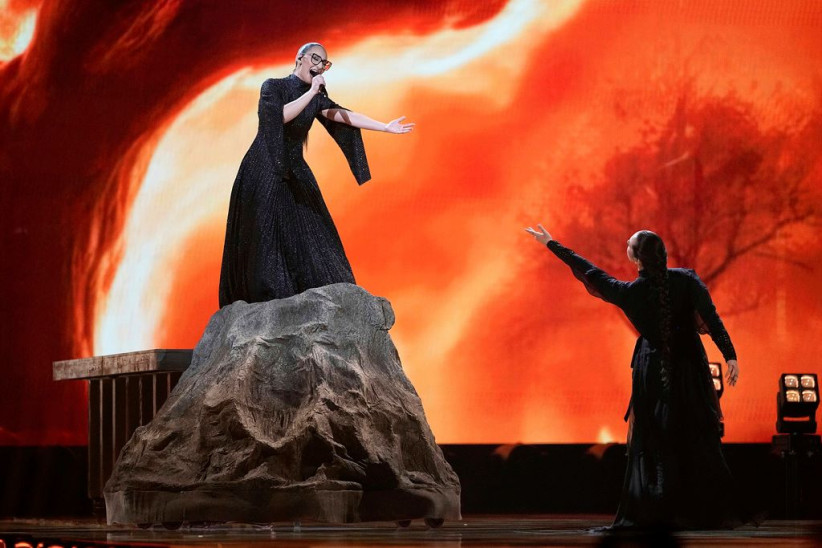All eyes on St. Jakobshalle of Basel, with a final characterized as the most unpredictable of recent years
With a stunning interpretation and intense symbolism, the Claudia represented her Greece in 69th Competition her Eurovision With the song “Stomach“, Winning the warm applause of the audience and standing out for its dynamic presence on stage St. Jakobshalle her Reign her Swiss. The Greek participation appeared in 17th place, conveying a strong message of memory and continuity.
The evening is projected live by ERT1 and Second schedule her Greek radiowith the Maria Kozakou and George Kapoutzidis to take over the commentary. The rating of the Hellenic Jury will be announced by Jenny Theona.
In spite of the fact that the Sweden maintains from the beginning of the event the position of the favorite in betting oddsnothing seems to be sure of the outcome of this year’s final. OR Austria lies in second position of forecasts and the France In the third, while the top five are completed by Netherlands and the Finland. The big Eurovision final has proven many times in the past that it has been surprised.
The 26 countries of the final – the appearance order
In the final there are overall participation 26 countries: the 20 qualified by the two semifinalsthe five automatically qualified countries of the so -called ‘Big Five ”(France, Germany, Spain, United Kingdom, Italy), as well as the organizer Switzerland. The appearance order was as follows:
- Norway – Kyle Alessandro – Lighter
- Luxembourg – Laura Thorn – La Poupée Monte Le Son
- Estonia – Tommy Cash – Espresso Macchiato
- Israel – Yuval Rafael – New Day Will Rise
- Lithuania – Katarsis – Tavo Akys
- Spain – melody – esa diva
- Ukraine – Ziferblat – Bird of Pray
- Kingdom – Remember monday – what the hell just happened?
- Austria – JJ – WASTED Love
- Iceland – Vaeb – Roa
- Latvia – Tautumeitas – Bur Man Laimi
- Netherlands – Claude – C’est la vie
- Finland – Erika Vikman – Ich Komme
- Italy – Lucio Corsi – Volevo Essere un duro
- Poland – Justyna Steczkowska – Gaja
- Germany – Abor & Tynna – Baller
- Greece – Claudia – Asteromata
- Armenia – Parg – Survivor
- Switzerland – ZOë Më – Voyage
- Malta – Miriana Conte – Serving
- Portugal – Napa – Deslocado
- Denmark – Sissal – Hallucination
- Sweden – Kaj – Bara Bada Bastu
- France – Louane – maman
- Saint Marin – Gabry Ponte – Tutta L’Italia
- Albania – Shkodra Elektronike – Zjerm
View This Post on InstagramA Post Shared by Eurovision ERT (@eurovisionert)
How is the vote done
Viewers of all participating countries can vote during the final, either telephoneeither with SMSeither through EUROVISION Official Application. Each user has the right to vote up to 20 timesbut without being able to support his own country.
The end result is 50% of public votes and 50% of national jury. The committees rate on the basis of the appearance of artists on Friday’s Jury Show, which is not broadcast live.
Initially, the score of the committees through representatives of each country (with a maximum of 12 points) is presented and then the public votes are added, forming the total ranking.
Since 2024, spectators from all over the world – even from countries that are not involved – have the ability to vote online 24 hours before the final. Their votes are counted as an additional participating country.
This year, another change has been added: the vote begins before the first appearance and remains open until about 40 minutes after all the songs are completed.
The message of ‘Asteromatas’
The song of Claudia, “Star”, in composition and lyrics of Arcade And of itself, it tells a story of the separation and search for light, inspired by the course of Pontian Hellenism and the Pontian genocide. The 22 -year -old performer is personally linked to the subject, as her family is of Pontian descent.
The title refers to a traditional characterization used in Smyrna for women with bright, impressive eyes. The word star symbolizes these forms, while the song also includes the Turkish word cevher (Jever), which means jewelry or gemstone – the Greek corresponding “gaivari”, which expresses love and appreciation for a person or something invaluable.
As Claudia itself has stated, the idea for the song came from the need to connect to its roots:
“We wanted to create a song I identify with and express me. She talks about uprooting and refugees, experiences that Greece knows well, both through its own history and through today’s refugee flows. My family were refugees. My grandmother, Grandma Claudia, has told me how they left Pontus, went to the Soviet Union and returned to Greece in 1991 to start from the beginning. “
Source :Skai
I am Frederick Tuttle, who works in 247 News Agency as an author and mostly cover entertainment news. I have worked in this industry for 10 years and have gained a lot of experience. I am a very hard worker and always strive to get the best out of my work. I am also very passionate about my work and always try to keep up with the latest news and trends.











